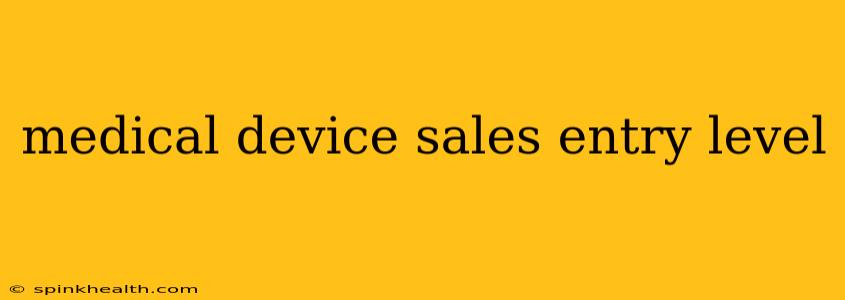Breaking into Medical Device Sales: A Beginner's Journey
The world of medical device sales might seem daunting, especially as an entry-level candidate. Images of high-pressure meetings and complex technologies likely come to mind. But the reality is far more nuanced, filled with opportunities for driven individuals to make a real difference in healthcare. This journey begins with understanding the landscape and strategically positioning yourself for success. My story, and the stories of many others, prove that breaking into this field is achievable with the right approach.
Let's explore this exciting field, tackling the common questions newcomers have:
What are the common entry-level positions in medical device sales?
Many aspiring medical device sales representatives start in roles that aren't directly sales-focused but provide invaluable experience. Think of it like building a strong foundation before constructing a skyscraper. These roles might include:
-
Inside Sales Representative: This position is often the gateway. You'll learn the product line, engage with customers over the phone, and develop crucial communication skills. Think of it as honing your sales skills in a supportive environment. Many inside sales roles transition to field-based positions after a successful tenure.
-
Clinical Specialist/Sales Support: These roles focus on the clinical applications of the devices. You'll work closely with doctors and nurses, learning about the clinical needs and how the technology addresses them. This deep product knowledge is a massive asset in sales.
-
Sales Training/Marketing Assistant: Supporting the sales team provides a close look at their daily operations. This allows you to learn the sales process, market trends, and competitor strategies. It’s a fantastic way to absorb the company culture and build relationships that can open doors later.
-
Account Manager (with a focus on customer retention): While this may not directly involve new sales, effectively managing existing accounts demonstrates the ability to build and maintain relationships – a key skill in medical device sales.
What kind of education or experience is typically required for entry-level medical device sales jobs?
While a degree in a science-related field (biology, chemistry, engineering) is advantageous, it’s not always a strict requirement. What is essential is demonstrating a strong work ethic, excellent communication skills, and a genuine interest in the healthcare industry. Here's what can make a difference:
-
Bachelor's Degree: While not mandatory, a degree showcases dedication and provides a foundational understanding. Any degree demonstrating strong analytical, communication, and problem-solving skills will strengthen your application.
-
Relevant Experience: Any experience in customer service, sales (even retail!), or healthcare is highly beneficial. It proves you can handle customer interactions, build rapport, and understand the nuances of a service-oriented environment.
-
Networking: Attending industry events, joining professional organizations (like AdvaMed), and connecting with people in the field are invaluable. Informational interviews can provide insights and open unexpected doors.
What are the typical responsibilities of an entry-level medical device sales representative?
The specific responsibilities will vary depending on the company and the product, but generally include:
-
Learning the Product Line: Thorough product knowledge is paramount. You'll spend considerable time understanding how the devices work, their clinical benefits, and their competitive advantages.
-
Prospecting and Lead Generation: Identifying and contacting potential clients, building relationships, and setting up meetings.
-
Sales Presentations: Presenting the product to healthcare professionals, showcasing its benefits, and answering their questions.
-
Relationship Building: Nurturing relationships with key decision-makers within hospitals and clinics.
-
Sales Cycle Management: Following up on leads, managing the sales process, and closing deals.
How can I improve my chances of landing an entry-level medical device sales job?
Success hinges on a multi-faceted approach:
-
Tailor your resume and cover letter: Highlight relevant skills and experiences, even if they're from seemingly unrelated fields. Demonstrate your understanding of the medical device industry and the specific company you're applying to.
-
Network strategically: Attend industry conferences, connect with professionals on LinkedIn, and reach out for informational interviews. Networking is crucial in this field.
-
Develop your sales skills: Take online courses, read sales books, and practice your presentation skills. Confidence and competence shine through.
-
Highlight your passion for healthcare: Your genuine interest in improving patient care will set you apart. Demonstrate your understanding of the industry's challenges and opportunities.
My journey into medical device sales wasn't linear. It involved setbacks and unexpected turns, but persistence and a proactive approach ultimately led to success. Remember, the field is competitive, but with dedication, the right skills, and a strong network, you too can break into this rewarding career.

